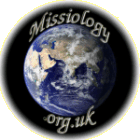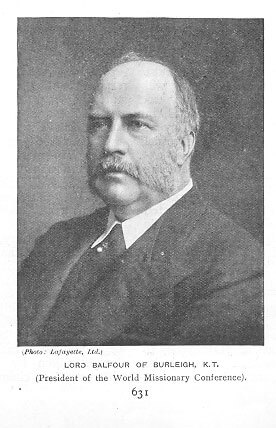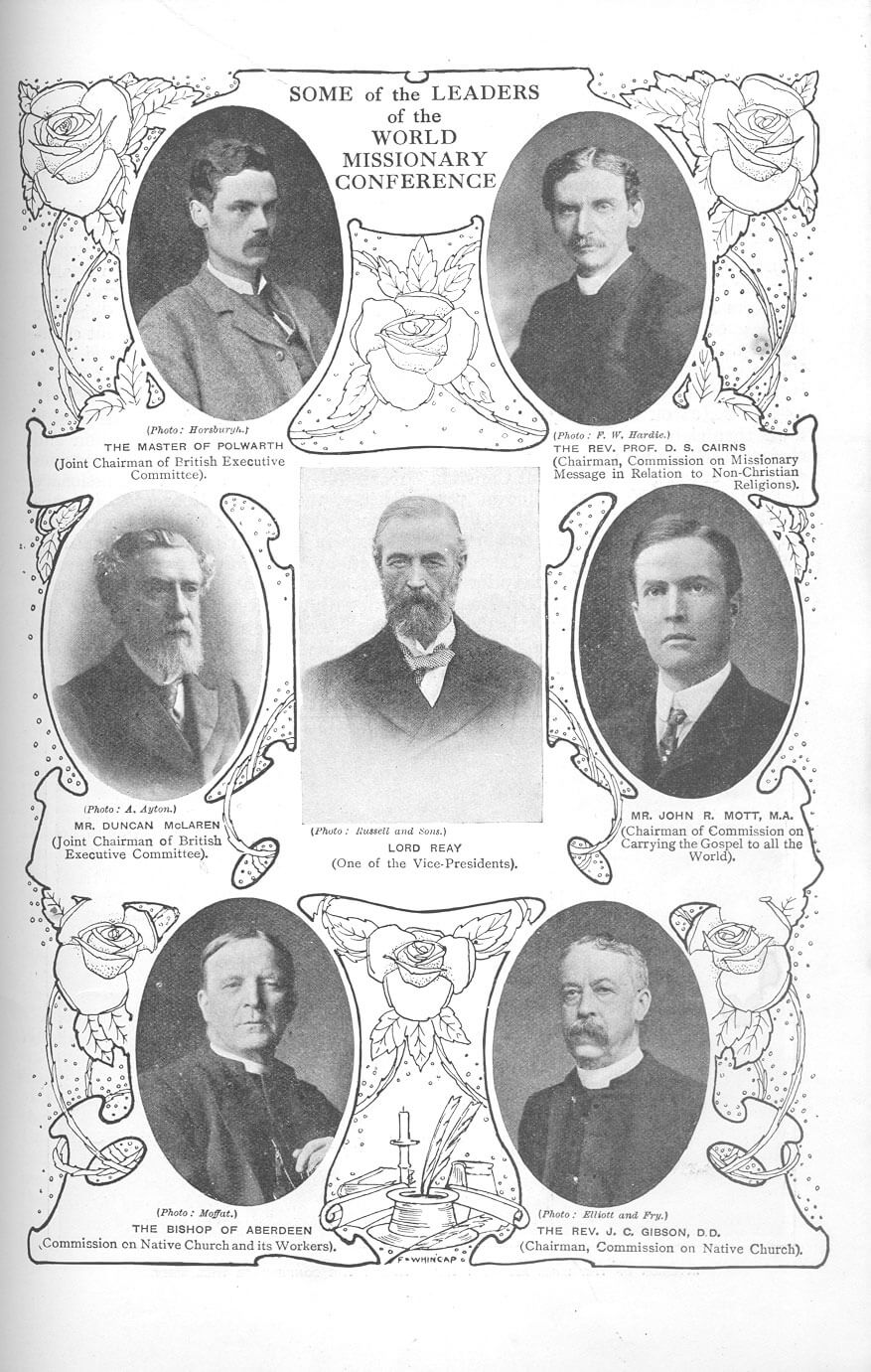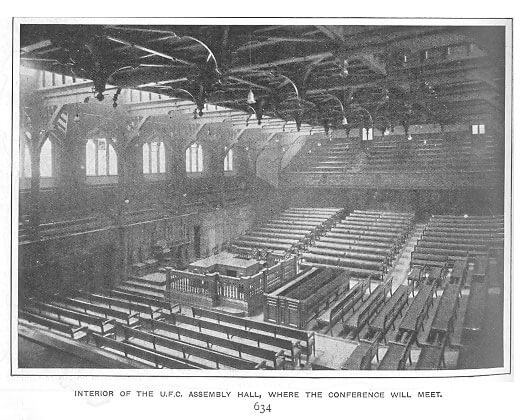 |
Mrs Ashley Carus-Wilson [d. 1935], "A World Parliament on Missions. The Meaning and Methods of the Edinburgh Conference of 1910,"
|

[p.613]
I must look out for some other career; for I am no longer thinking of holy orders. The fact is that after this recent trouble and other things, I cannot believe the Christian creed as I used to do." A young man made the above sad confession to a former college friend, now a clergyman, and got this answer:-
"Promise me that you will come to no final decision for six months. Meanwhile, I shall be very grateful if you can give a hand with my work for the Missions to Seamen on its philanthropic side." He agreed, and those months of co-operation in active religious work, of close contact with temptation and sin, with suffering and deep spiritual need, warded off and healed and satisfied by a living Christianity, and by that alone, scattered the mists of doubt born of anxiety and perplexity through adverse circumstances and acquaintance with speculative unbelief. The Church regained a member strong in the faith as he had never been before.
 That actual crisis in the life of an individual Christian may be taken as typical of a chapter now being written in the story of the Church as a whole. Sometimes it appears weary and discouraged, distracted by interminable controversies, bewildered by multiplying and persistent questionings and criticisms. Surely the remedy lies not in mere ingenuitics of argument, or in unwise concession to prevailing ideas that may have no permanent hold on men's minds, but in going forth to minister to human need with the gospel of Christ, the one true comfort in all sorrow, the one satisfactory solution of all problems. In a word, the Church will be strong and pure at home, as it shows itself missionary-hearted abroad. This is the thought that is to be brought home to us all in a striking way by the WORLD MISSIONARY CONFERENCE which meets at Edinburgh this year from June 14 to June 23. Its first aim is to educate the Church as to its missionary obligations, and, through that education, to quicken its own spiritual life. Conferences with a similar aim have been held before, but this Conference promises to be unique because it has yet another aim. Besides being a demonstration to the general Christian public of what missionary work means and why it should be supported, it is an earnest attempt to do a serious bit of work by gathering together experts to discuss missionary problems and methods, so that the Church may be enabled to see more clearly its task of taking the gospel to the world, and may do that task more efficiently.
That actual crisis in the life of an individual Christian may be taken as typical of a chapter now being written in the story of the Church as a whole. Sometimes it appears weary and discouraged, distracted by interminable controversies, bewildered by multiplying and persistent questionings and criticisms. Surely the remedy lies not in mere ingenuitics of argument, or in unwise concession to prevailing ideas that may have no permanent hold on men's minds, but in going forth to minister to human need with the gospel of Christ, the one true comfort in all sorrow, the one satisfactory solution of all problems. In a word, the Church will be strong and pure at home, as it shows itself missionary-hearted abroad. This is the thought that is to be brought home to us all in a striking way by the WORLD MISSIONARY CONFERENCE which meets at Edinburgh this year from June 14 to June 23. Its first aim is to educate the Church as to its missionary obligations, and, through that education, to quicken its own spiritual life. Conferences with a similar aim have been held before, but this Conference promises to be unique because it has yet another aim. Besides being a demonstration to the general Christian public of what missionary work means and why it should be supported, it is an earnest attempt to do a serious bit of work by gathering together experts to discuss missionary problems and methods, so that the Church may be enabled to see more clearly its task of taking the gospel to the world, and may do that task more efficiently.
It is after all only during the last century that Reformed Christendom has to
[p.614]
any extent recognised the missionary obligation. With one exception, the societies now carrying it out are little more than a hundred years old. Pioneer missionaries whose enthusiasm and gallantry and devotion we cannot honour too much have laboured in many lands, and if we measure achievement by the amount given in men and means, we cannot deny that their success has surpassed the expectations of all who did not sincerely believe that the prospects of the enterprise were as bright as the promises of God. But if we compare what has been done with what remains to be done, we must acknowledge that the task is only begun. It is true that we have seen paganism discredited and vanishing away in not a few parts of North America, Australasia, and Africa; but the great ancient organised religions of Asia still confront the Church, and in assaulting them it undertakes a harder conflict than any waged by those who prevailed over the heathenism of the ancient world or of barbarian Europe. And now, with the greatest missionary age hitherto, the nineteenth century, behind us, a fresh start must be made so that the twentieth century may become a yet greater missionary epoch.
The Conference then will concern itself with what has been done; still more with what is going to be done; and most of all with how it may be done. It will endeavour to co-ordinate missionary experience from all parts of the world, in order to arrive at a concerted policy as to the wisest plan for distributing gospel agents and agencies; subjecting all existing plans and methods to searching investigation. It will endeavour to be a beginning, not an end. Its characteristic feature was not inaptly suggested by a tradesman, who, getting a little mixed as to its designation, addressed a bill to the offices of "The Working Missionary Conference."
A Programme of Work
How then, and by whom, is its work to be accomplished? Definite preparation for it began when an international committee met at Oxford in July, x9o8, to spend six days together planning its programme. Eight Commissions of about 6: twenty members each were appointed to deal with eight different aspects of missionary enterprise; and every effort was made to secure that they should be fairly representative of that enterprise as a whole. Three of the chairmen are Americans-one being, however, by birth British; and of the five British chairmen, four are Scottish. Of 165 members, 92 are British, 51 are from the United States, and 22 from France, Germany, Holland, Switzerland, and Scandinavia; which corresponds to Professor Warneck's figures showing that Great Britain contributes nearly twice as much as the United States, and the States rather more than twice as much as the Continental Protestant Churches. Again, of the 92 British members about half are Anglicans, about a quarter Presbyterians, the remaining quarter being Congregationalists, Baptists, and Wesleyans in about equal proportion. There are 55 laymen and 14 women; of the remaining 96 ordained members, eight are bishops of the Anglican communion, two of them American, and there are two Moravian bishops and one bishop of the American Methodist Episcopal Church. A very large number of them have extensive and intelligent acquaintance with the mission field all over the world, and many are or have been missionaries. Four other classes are also represented, viz. leaders of the Church, responsible officials of missionary societies, statesmen and Empire-builders abroad, and students of missionary subjects at home. Each Commission is in touch with several hundred "corresponding members," mostly missionaries of long experience and prominent "native Christians," as we call them for lack of a happier phrase. And if we wanted proof that the Conference is already recognised as promising more than mere talk of the lips that tendeth to penury, we should point not to the fact that nearly 4,000 has already been contributed voluntarily towards its expenses; or to the fact that all who attend-even the chosen delegates for whom hospitality will be provided find their own travelling expenses, and pay for the privilege of being at its meetings; we should point rather to the time and thought given by 165 notable people, with countless claims on them already,
[p.633]

[p.634]
to attending the sessions of the Commissions, and to mastering the voluminous material forwarded in answer to elaborate questions, by these hundreds of correspondents abroad. At one meeting of two days held in New York for American members, two were present who had to spend two nights each way in their trains in order to come. And several American members have crossed the Atlantic more than once to attend sessions in this country.
The subject for the first Commission is "Carrying the Gospel to All the World," and on it, as on the sixth, there are no fewer than eight Americans, including the chairman, Mr. John R. Mott, the general secretary of the World's Student Christian Federation, New York, well known personally to college students in almost every part of the globe. British members include Bishop Montgomery, late of Tasmania, and now secretary of the Society for the Propagation of the Gospel; Dr. Eugene Stock, late editorial secretary of the Church Missionary Society; Dr. George Robson, of the United Free Church of Scotland; and Mr. Marshall Broomhall, the editorial secretary of the China Inland Mission. All four have written books familiar to everyone interested in missions.
"The Native Church and its Workers" is the subject for the second Commission; which contains nine missionaries, whose periods of foreign service add up altogether to almost 150 years. Its chairman, Dr. J. Campbell Gibson, was in China for thirty-five years, and became joint chairman of the Shanghai Conference of 1907. The Bishop of Aberdeen heads, and the secretary of the Baptist Missionary Society ends the alphabetical list, and side by side on it appear Dr. Wardlaw Thompson and the Rev. Duncan Travers, secretaries respectively of the London Missionary Society, the leading Nonconformist missionary agency, and of the Universities Mission in East Africa, officered and supported by the " Highest " of Anglicans. It includes Mr. Duncan McLaren, chairman, with the Master of Polwarth, of the British Executive Committee, which is responsible for the Conference as a whole.

"Education in Relation to the Christian-
[p,635]
isation of National Life" is the subject of the third Commission. Its chairman is the Bishop of Birmingham, and it includes nearly a dozen other Anglicans, and three women-the vice-principal of Westfield College, and the late principal of St. Mary's College, Paddington, and Miss Dodge of New York.
"The Missionary Message in Relation to Non-Christian Religions" is the subject for the fourth Commission; and here foreign students are more numerous than anywhere else. Professor Cairns, of the United Free Church of Scotland College, Aberdeen, is its chairman, and Mr. Robert Speer, its vice-chairman: and their colleagues include the Bishop of Ossory, Canon Robinson, editorial secretary of the S.P.G., and Dr. Garvie, the principal of New College, London, all authors of well-known books.
"The Preparation of Missionaries" is considered by the fifth Commission, and more women-four in all-sit on it than on any other. Its chairman, Dr. W. Douglas Mackenzie, is president of Hartford Theological Seminary, U.S.A., and son of John Mackenzie, the missionary of whom the Pall Mall Gazette once said that "he would live in the annals of the Empire as the man who saved Africa for England." He is supported by nine other heads of colleges, the Masters of Selwyn College; Cambridge, and of Magdalen College, Oxford; the Dean of Oberlin University, U.S.A.; the principals of Marfield College, Oxford, of Wycliffe College, Toronto, of Harley College, London, of the Women's Missionary College at Edinburgh, of the Training College of the Swedish National Missionary Society, of the Scarrit Training College, U.S.A.-and the Warden of the House of the Sacred Mission, Kelham.
The sixth Commission considers "The Home Basis of Missions," and ten laymen sit on it. Its chairman is Dr. James Barton, secretary of the American Board of Commissioners for Foreign Missions, the oldest missionary society in the United States. With him are Mr. Campbell White, general secretary of the Laymen's Missionary Movement of New York; the hon. secretary of the Anglican Central Board of Missions; and the home secretaries of the Church Missionary Society and the London Missionary Society.
"The Relation of Missions to Governments" occupies the seventh Commission. It is presided over by Lord Balfour of Burleigh, president of the whole Conference, and Secretary for Scotland in Mr. Balfour's last administration, and includes several prominent public men :-Mr. Seth Low, leader of the struggle for Municipal Reform in New York; Sir Robert Hart, since r854 in the Chinese Consulate and Customs, whose distinguished service to two Empires is known to all; Sir Andrew Wingate, who after thirty years' service in India became a member of the Viceroy's council; with two members of the United States Senate, and the adviser on missionary matters to the German Government.
The eighth and last Commission considers "Co-operation and the Promotion of Unity," and has another distinguished public servant for its chairman in Sir Andrew Fraser, late Lieutenant-Governor of Bengal, whose son is principal of Trinity College, Kandy. Bishops and officials of the great missionary societies are conspicuous on its list. Its vice-chairman is Mr. Silas McBee, editor of the New York Churchman, and it includes, besides the Bishops of Southwark and Albany, U.S.A., the Dean of Westmister and Professor Warneck.
The views, or rather judgments, of these important Commissions of highly qualified men; will be published in volumes which promise to be a valuable addition to missionary literature. The meetings of the Conference in the Free Church Assembly Hall, before which they will be brought in the first instance, will be attended by only the 1,100 delegates sent to it as representing the various societies. Simultaneous meetings will be held in the Synod Hall, which holds 2,000; and, for these, tickets can be obtained through the missionary societies by their subscribers. Further meetings of a more popular kind will take place in Edinburgh and Glasgow, and doubtless elsewhere, to bring home to the general public the instruction and inspiration of the World Missionary Conference. Meanwhile, all who have at heart the advancement of our Redeemer's Kingdom are urged to help forward this carefully organised effort on its behalf, not only by intelligent interest, but also by intercession.